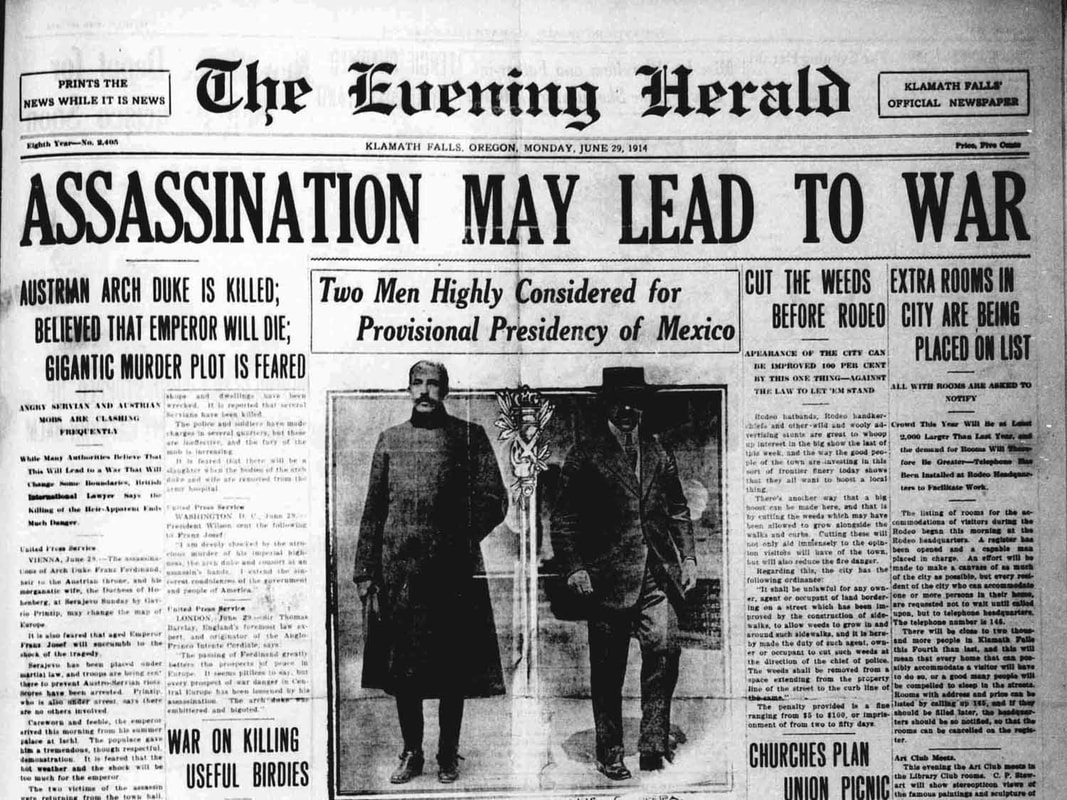The diplomats and statesmen were drawn into war because they believed that a diplomatic defeat or loss of face for their nation was worse than war. Austria-Hungary believed that the Serbian government had had some suspicion of Princip’s assassination plot and should have given Austria warning.
For this reason, Austria-Hungary decided to make stiff demands on Serbia after the assassination of Francis Ferdinand on June 28, 1914, which had involved agents of the Serbian terrorist organization, the Black Hand. Before doing so, however, Austria consulted Germany, which promised to support whatever policy Austria might adopt toward Serbia—the equivalent of a diplomatic “blank check.”
Encouraged, the Austrian government on July 23 sent Serbia an ultimatum to be answered within forty eight hours. The ultimatum may have been designed to be unacceptable. It required that publications hostile to Austria be suppressed, anti-Austrian patriotic organizations be dissolved, teachings that smacked of propaganda be barred from the schools, officials known for conducting anti-Austrian campaigns be dismissed, Serbian officials believed to be involved in the assassination plot be arrested, and a formal apology be made.
These demands the Serbs might have accepted, but two others they could not: that Austrian officials work with the Serbians in investigating the plot, and that judicial action be taken against any found guilty by this joint investigation. While accepting most points, the Serbian reply was evasive on the most important ones, and the Serbs had begun mobilization before delivering it. Serbia apparently hoped this stratagem would allow time for further negotiations, but the Austrian minister immediately left Belgrade, and Austria began to call up its troops. Austria declared war on July 28.
Germany supported Austria in this decision, but the German diplomats still equivocated, putting pressure on Vienna to act against Serbia while trying to find out whether Britain would remain neutral in a general war— a constant German goal. If war were to come, the Germans wished to place the guilt on Russia. Since Russia was beginning the full mobilization of its armies, the kaiser, on July 29, told Czar Nicholas II in a personal telegram about German attempts to get the Austrians to compromise.
Apparently this telegram caused full Russian mobilization to be modified into partial mobilization against Austria and caused the Austro-Russian talks to be resumed on July 30. If German Chancellor Theobald von Bethmann Hollweg (1856-1921) could make it appear that a full-scale European war was the fault of the Russians, then he still had some hope of Britain’s neutrality.
But mobilization was not easy in Russia, a country of vast distances and poor communications. The Russian military feared that their enemies would get the lead on them, so the Russian government decided to renew general mobilization. Germany at once insisted that all Russian mobilization cease, and, when it continued, ordered its own at 4:00 P.M. on August 1. Germany declared war on Russia three hours later.
France, meantime, had determined to stand by its Russian ally and mobilized at 3:55 P.M. on August 1. Having failed to get Britain to guarantee French neutrality, and apparently convinced that France would come to Russia’s support, Germany invaded Luxembourg on August 2 and demanded from Belgium permission to cross its territory, in exchange for Belgian neutrality. Belgium refused, and on August 3 Germany declared war on France and invaded Belgium to seize the ports on the English Channel and bear down upon Paris from the west.
Britain had been wavering. Although her entente with France did not legally bind the two nations together, it had led to close coordination of defense plans by the French and British military and naval staffs, and so perhaps Britain would have come into the war anyway. What made entry certain was German violation of the neutrality of Belgium. Sir Edward Grey seized firmly upon the German invasion of Belgium as grounds for taking action, which he supported for political reasons.
On August 4 Britain declared war on Germany. Bethmann-Hollweg, informed of this action, let slip the phrase that Britain had gone to war just for a “scrap of paper”—the treaty of 1839 that established Belgian neutrality. This unhappy phrase not only solidified British opinion in favor of the war but was primarily responsible for the later charge of war guilt that was laid against Germany.

